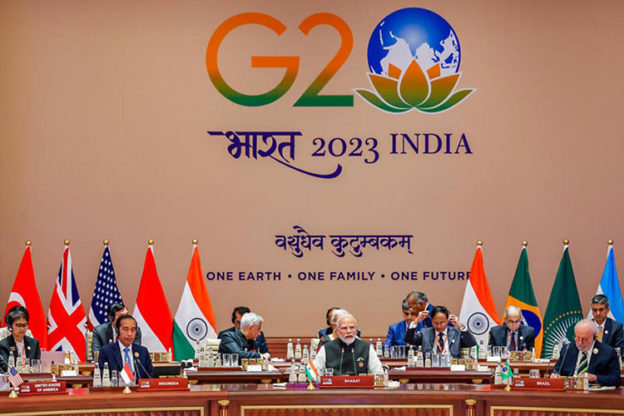India’s G20 presidency came at a time when the global economies were facing uncertainties, inflation and recessionary pressures were piling up while geopolitical friction was presenting unprecedented challenges.
“The future depends on what we do in the present”. A famous Mahatma Gandhi quote which figurately resonated around Raj Ghat on a drizzly Sunday morning as Day 3 of G20 summit India kicked off. World’s most powerful leaders led by our Prime Minister Narendra Modi walked barefoot to pay homage at the site of the eternal flame that burns for the father of our nation is an iconic image that will resonate with us for times to come. How did we get there is a story in itself.
India’s G20 presidency came at a time when the global economies were facing uncertainties, inflation and recessionary pressures were piling up while geopolitical friction was presenting unprecedented challenges. Representing around 85 per cent of the global GDP, over 75 per cent of the global trade, and about two-thirds of the world population, many nations probably did not see eye to eye on a multitude of issues. But was that going to derail the success of the marquee events in India’s history? Not a chance!
That is where India’s strength in bilateral relationships and astute diplomacy came into play. This is on the back of the unique ability to bring everyone together, build consensus, and chart an agenda for the global good, which is perhaps India’s biggest achievement from the summit. There’s probably no better example than the momentous G20 New Delhi Leaders Declaration comprising 83 paras without any footnotes with a 100 per cent consensus on economic and social issues, some of which are sensitive in nature.
Truly encapsulating the theme of “One Earth, One Family, One Future”, India probably did achieve everything it wanted. But we must remember that all that was achieved was due to the rigorous hard work of our G20 sherpas, the catalyst of change and transformation. The theme of India’s presidency truly merged with the objectives we set out to accomplish, helping us at the negotiation table and getting our point across to other countries.
One Earth
One of the key aspects of India’s presidency was to drive home its point on climate change and the action that is needed. While this posed some challenges, the ability to reach a consensus on reducing fossil fuel use, increasing renewable energy targets, and lowering greenhouse gas emissions is a significant success. The ongoing geo-political conflict was also a divisive issue but a joint declaration garnering unanimous support from all highlights the collaborative approach India brings to the table.
One Family
G20 became G21 as the African Union gained a seat at the top table under India’s presidency. A significant step in the country’s drive to see reforms in global and multilateral institutions, it also signaled India’s efforts to put forward the concerns of the developing world. Adding to this momentum, there were also calls for strengthening multilateral development banks for a more effective capital adequacy framework which should potentially yield additional lending headroom in the times to come. If there was any doubt before then there shouldn’t be any more that India has become the “Voice of the Global South” and it is here to stay.
One Future
Not just for the here and now, India’s presidency has been one with a keen eye on the future. Global Biofuel Alliance, joined by nineteen countries and twelve international organisations, is a promising initiative in the quest for clean energy, facilitating access to biofuels across emerging economies with the overall goal of sustainability. Another significant development which US President Joe Biden dubbed “A really big deal” was the joint announcement between India, US, UAE, Saudi Arabia, France, Germany, Italy, and the European Union to establish the India-Middle East-Europe Economic Corridor. A critical step to bolster economic development by fostering connectivity and economic integration between Asia, the Arabian Gulf, and Europe, this corridor might just turn out to be a historic investment to safeguard regional supply chains, boost trade accessibility, and enable a closer world.
Truly a watershed moment for India rightly reinforced its standing as a superpower to drive consensus on global issues while balancing the growth priorities of emerging markets. For a country which has witnessed a lot of firsts recently from lunar landing to solar mission, this summit closer to home has brought home the statement PM Modi made at his last US state visit “When India grows, the world grows”.
This summit touched the aspirations of 1.4 billion people and then some more. If there ever was a statement of India’s arrival at the top table, then probably this was it. While the presidency is still not over and there’s still a lot more to achieve and impact before it gets handed over to Brazil in November, one thing is for certain, it has set an enormous precedent for others to follow.
https://www.financialexpress.com/policy/economy-g20-summit-2023-indias-moment-to-step-up-to-step-in-3252496/





